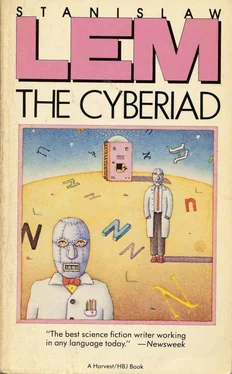“You can take it now!”
The rest of the day they spent blowing soap bubbles from the veranda. That evening Lord Protozor, Master of the Royal Hunt, came with an escort and politely but firmly informed them that they were to go with him at once to an assigned place. They were required to leave all their possessions behind, even their clothes; in exchange they were given rags, then put in irons. The guards and police dignitaries present were astounded by their perfect sang-froid: instead of demanding justice or trembling with fear, Trurl giggled as the shackles were being hammered on, saying he was ticklish. And when the constructors were thrown into a dark and dismal dungeon, they promptly struck up a rousing chorus of “Sing Sweet Software.”
Meanwhile mighty Krool rode forth from the village on his mighty hunting chariot, surrounded by all his retinue and followed by a long and winding train of riders and machines, machines that included not only the traditional catapult and cannon, but enormous laser guns and beta ray bazookas, and a tar-thrower guaranteed to immobilize anything that walked, swam, flew or rolled along.
And so this grand procession wended its way to the royal game preserve, and many jokes were made, and boasts, and haughty toasts, and no one gave a thought to the two constructors, except perhaps to remark that those fools were in a pretty pickle now.
But when the silver trumpets announced His Majesty’s approach, one could see a huge vehicle-refrigerator coming up in the opposite direction. Its door flung open, and for one brief moment there gaped the black maw of what appeared to be some sort of field gun. Next there was a boom, a puff of yellow smoke, and something came rocketing out, a form as blurry as a tornado and with the general consistency of a sandstorm; it arced through the air so fast that no one really got a good look at it anyway. Whatever it was flew a hundred paces or more and landed without a sound; the curtain that had been wrapped around it floated to the earth, glass bells tinkling oddly in that perfect silence, and lay there like a crushed strawberry. Now everyone could see the beast clearly—though it wasn’t clear at all, but looked a little like a hill, rather large, fairly long, its color much like its surroundings, a clump of dried-up weeds. The King’s huntsmen unleashed the whole pack of automated hounds (mainly Saint Cybernards and Cyberman pinschers, with an occasional high-frequency terrier); these hurled themselves, howling and slavering, at the crouching beast. The beast didn’t rear back, didn’t roar, didn’t even breathe fire, but only opened its two eyes wide and reduced half the pack to ashes in a trice.
“Oho! Laser-eyed, is it?” cried the King. “Hand me my trusty duralumin doublet, my bulletproof buckler, my halberd and arquebus!” Thus accoutered and gleaming like a supernova, he rode out upon his fearless high-fidelity cyber-steed, came nigh the beast and smote it such a mighty blow that the air crackled and its head tumbled neatly to the ground. Though the retinue dutifully hallooed his triumph, the King took no delight in it; greatly angered, he swore in his heart to devise some special torment for those wretches who dared to call themselves constructors. The beast, however, shook another head out of its severed neck, opened its new eyes wide and played a withering beam across the King’s armor (which, however, was proof against all manner of electromagnetic radiation). “Well, those two weren’t a total loss,” said the King to himself, “though this still won’t help them.” And he recharged his charger and spurred it into the fray.
This time he swung full and cleaved the beast in twain. The beast didn’t seem to mind—in fact, it positioned itself helpfully beneath the whistling blade and gave a grateful twitch as it fell. And small wonder! The King took another look: the thing was twinned instead of twained! There were two spitting images, each a little smaller than the original, plus a third, a baby beast gamboling between them—that was the head he had cut off earlier: it now had a tail and feet and was doing cartwheels through the weeds.
“What next?” thought the King. “Chop it into mice or little worms? A fine way to hunt!” And with great ire did he have at it, hewing with might and main until there were no end of little beasts underfoot, but suddenly they all backed off, went into a huddle, and there stood the beast again, good as new and stifling a yawn.
“H’m,” thought the King. “Apparently it has the same kind of stabilization mechanism that—what was his name again?—Pumpington—that Pumpington tried to use. Yes, I dealt with him myself for that idiotic trick… Well, we’ll just wheel out the antimatter artillery…”
He picked one with a six-foot bore, lined it up and loaded it himself, took aim, pulled the string and sent a perfectly silent and weirdly shimmering shell straight at the beast, to blow it to smithereens once and for all. But nothing happened—that is, nothing much. The beast only crouched a little lower, put out its left hand, long and hairy, and gave the King the finger.
“Bring out our biggest!” roared the King, pretending not to notice. And several hundred peasants pulled up a veritable giant of a cannon, all of eighty-gauge, which the King aimed and was just about to fire—when all at once the beast leaped. The King lifted his sword to defend himself, but then there was no more beast. Those who saw what happened next said later that they were sure they had taken leave of their senses, for as the beast flew through the air, it underwent a lightning transformation, the grayish hulk divided up into three men in uniform, three policemen, who, still aloft, were already preparing to do their duty. The first policeman, a sergeant, got out the handcuffs, maneuvering his legs to keep upright; the second held on to his plumed shako with one hand, so it wouldn’t blow off, and with the other pulled out a warrant from his breast pocket; the third, apparently a rookie, assumed a horizontal position beneath the feet of the first two, to cushion their fall—after which, however, he jumped up and carefully dusted off his uniform. Meanwhile the first policeman had handcuffed the dumbfounded King and the second slapped the sword from his hand. Feebly protesting, the suspect was then summarily trotted off the field. The entire hunting procession stood rooted to the spot for a minute or two, then gave a yell and followed in hot pursuit. The snorting cybersteeds had practically caught up with the abductors, and swords and sabers were unsheathed and raised to strike, but the third policeman bent over, depressed his bellybutton and immediately the arms grew into two shafts, the legs coiled up, sprouting spokes, and began to turn, while the back formed the seat of a green racing gig to accommodate the other two policemen, who were vigorously plying the now-harnessed King with a whip, to make him run faster. The King obliged and broke into a mad gallop, waving his arms frantically to ward off the blows that descended upon his royal head; but now the huntsmen were gaining again, so the policemen jumped on the King’s back and one slipped down between the shafts, huffed and puffed and turned into a spinning top 7a dancing whirlwind, which gave wings to the little gig and whisked it away over hill and dale till it disappeared altogether in a cloud of dust. The King’s retinue split up and began a desperate search with Geiger counters and bloodhounds, and a special detachment came running up with shovels and flamethrowers and left no bone unburned in all the neighboring cemeteries—an obvious error, occasioned most likely by the trembling hand that hastily telegraphed the order from the observation balloon that had monitored the hunt. Several police divisions rushed here and there, searched the grounds, every bush, every weed, and both x-rays and laboratory samples were diligently taken of everything imaginable. The King’s charger was ordered to appear before a special board of inquiry appointed by the Prosecutor General. A unit of paratroopers with vacuum cleaners and sieves was dropped on the royal game preserve to sift through every last particle of dust. Finally, the order was issued that anyone resembling a policeman was to be detained and held without bail, which naturally created difficulties—one half of the police force, as it turned out, had arrested the other, and vice versa. At dusk the huntsmen and soldiers returned to the village dazed and bedraggled with the woeful tidings that neither hide nor hair of the King’s person was anywhere to be found.
Читать дальше












